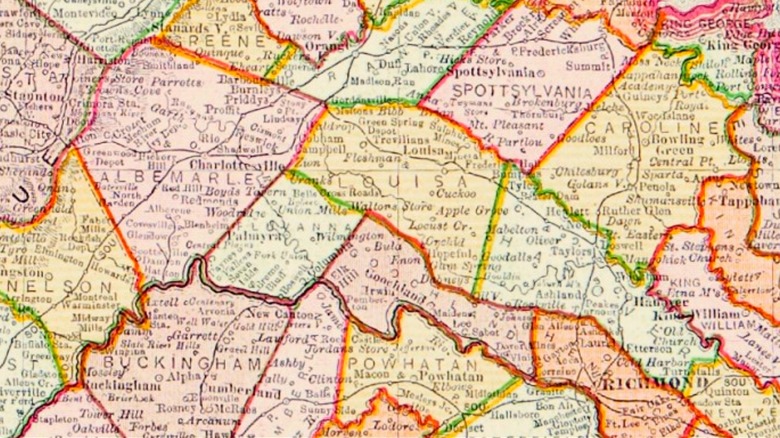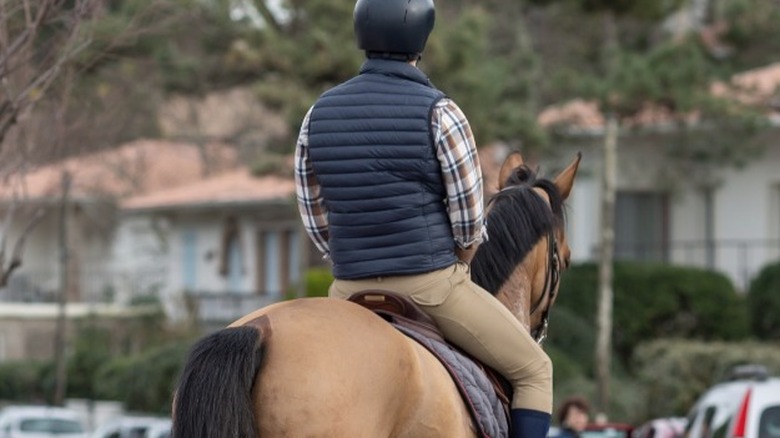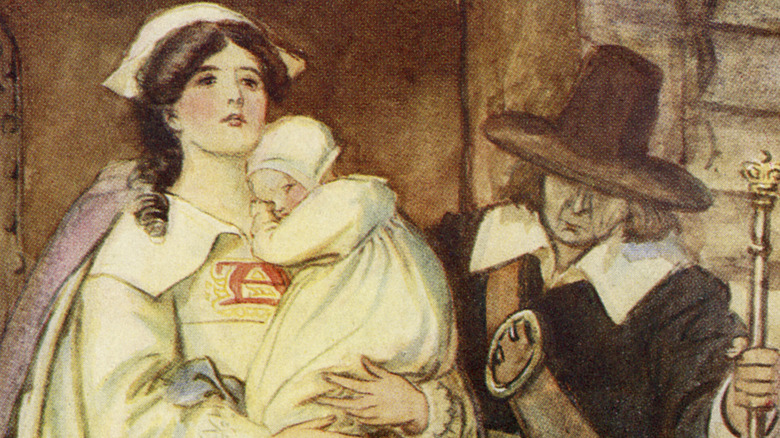Weirdest Laws In Virginia
As a state where you can buy a firearm at your local Walmart and a bottle of wine at 711, the Commonwealth of Virginia isn't known for its strict regulations. Regardless, the Old Dominion state does, in fact, have ample legislation on the books. If you violate the law in Virginia, you can be met with harsher penalties and steeper fines than in some of its neighboring states, but not every law is enforced.
Defunct laws, sometimes referred to as Blue Laws (which, strictly speaking, pertain to alcohol consumption on Sundays, but are otherwise simply historic laws that were never overturned — via Richmond Times-Dispatch), often remain in effect long after they expire in relevance. Other laws are unique but lesser-known, and tend to pertain only to jurisdictional quirks or intensely specific scenarios. From these two categories, anachronistic and bizarre, we've picked just a few of Virginia's weirdest laws. You've probably broken a few, and if not, you know someone who has.
Banned: swearing at someone (on the telephone)
As the Huffington Post noted, it is illegal in Virginia to use profanity to describe another person, or swear at another person generally, via telephone or electronic device. Anyone convicted would be guilty of a class one misdemeanor, which is punishable in the state by up to 12 months in jail. The text of the law (§ 18.2-427: "Use of profane, threatening, or indecent language over public airways or by other methods") reads:
"Any person who uses obscene, vulgar, profane, lewd, lascivious, or indecent language, or makes any suggestion or proposal of an obscene nature, or threatens any illegal or immoral act with the intent to coerce, intimidate, or harass any person, over any telephone or citizens band radio, in this Commonwealth, is guilty of a Class 1 misdemeanor... 'Over any telephone' includes, for purposes of this section, any electronically transmitted communication producing a visual or electronic message that is received or transmitted by cellular telephone or other wireless telecommunications device." In other words, watch your mouth.
Banned: calling someone over and over in order to annoy them
Spam-calling your friend or texting them repeatedly for the express purpose of annoying them is actually forbidden under Virginia law. In addition to an array of surprisingly stringent and densely-worded laws pertaining to conduct over the telephone, "causing [a] telephone or pager to ring with intent to annoy" is strictly forbidden under the Code of Virginia (§ 18.2-429):
"Any person who, with or without intent to communicate but with intent to annoy any other person, causes any telephone or digital pager, not his own, to ring or to otherwise signal, and any person who permits or condones the use of any telephone under his control for such purpose, is guilty of a Class 3 misdemeanor. A second or subsequent conviction under this subsection is punishable as a Class 2 misdemeanor if such prior conviction occurred before the date of the offense charged."
Banned: burning A flag (any flag)
While laws against defacing or disrespecting the United States flag are commonplace, in Virginia it is illegal to intentionally defile or deface any flag at all. Under Chapter 11 of the Code of Virginia ("Offenses Against the Sovereignty of the Commonwealth"), Article 2 ("Uniform Flag Act"), such disrespect of any emblem, symbol, or insignia with the intent to demonstrate contempt is forbidden. The text of the law (§ 18.2-488: "Mutilating, defacing, etc.") reads:
"No person shall publicly burn with contempt, mutilate, deface, defile, trample upon, or wear with intent to defile any such flag, standard, color, ensign or shield." While this law is probably intended to target political demonstrations, its application is quite broad: Is it illegal to deface the flag of a rival sports team? Considering the fact that prosecution requires enforcement by an individual, so long as you pick the right sports team, surely it can't be.
Banned: riding a horse toward the south through the area known as 'Big Woods' between 4-7 p.m.
In Poquoson, Virginia, it is illegal to ride or drive a horse in a reckless manner across the street. More specifically, it is illegal to ride a horse at all on Wythe Creek Road, Poquoson Avenue, or a portion of Little Florida Road West known as "Big Woods," which is described as "west to a point where the outfall drainage ditch, which runs in a southerly direction..." between 4 p.m. and 7 p.m. on weekdays. Maybe this makes sense to someone who lives in Poquoson.
The text of the law (Sec. 14-1: "Riding or driving horses on streets or rights-of-way") as written in the Poquoson Code of Ordinances reads: "...No person shall run, ride, drive or otherwise use a horse on Wythe Creek Road, Poquoson Avenue or that section of Little Florida Road West from its intersection with Poquoson Avenue, west to a point where the outfall drainage ditch, which runs in a southerly direction through the area generally referred to as the 'Big Woods,' intersects Little Florida Road, from 4 p.m. to 7 p.m. on Monday, Tuesday, Wednesday, Thursday and Friday of each and every week. ... Any person violating any provision of this section shall be guilty of a class 4 misdemeanor."
Banned: Calling someone's mother a dirty word
In the City of Richmond (again), it is against the law to use obscene language against another person when addressing them or when describing their "relations" (family members) — that is, if the insult is one that could be reasonably expected to "provoke a breach of the peace" (in other words, only if your joke is really good). The penalty for said joke is a class three misdemeanor, which can be punishable by fines up to $500.
The text of the City ordinance (Sec. 19-112: "Using abusive language to another") reads as follows: "If any person shall, in the presence or hearing of another, curse or abuse such other individual or use any violent abusive language to such individual concerning such individual or any of the individual's relations or otherwise use such language, under circumstances reasonably calculated to provoke a breach of the peace, such person shall be guilty of a Class 3 misdemeanor."
Banned: Adultery
Surprise, surprise: Another state has banned adultery. Laws forbidding cheating on your spouse seem anachronistic and tend to originate in eras when laws regarding chastity were more common, but while many laws regulating various sexual practices have been repealed, laws forbidding adultery often remain on the books. Why? That's anyone's guess. Perhaps it's not a good look for a state representative to make "legalizing adultery" their champion cause — this would probably fare poorly with both voters and, more immediately, with their spouse.
Alongside other laws prohibiting serious offenses like child abuse and bestiality, adultery is forbidden in the Code of Virginia under Chapter 8 ("Crimes Against Morals and Decency") in § 18.2-365. The text of the law reads: "Adultery defined; penalty. Any person, being married, who voluntarily shall have sexual intercourse with any person not his or her spouse shall be guilty of adultery, punishable as a Class 4 misdemeanor."






